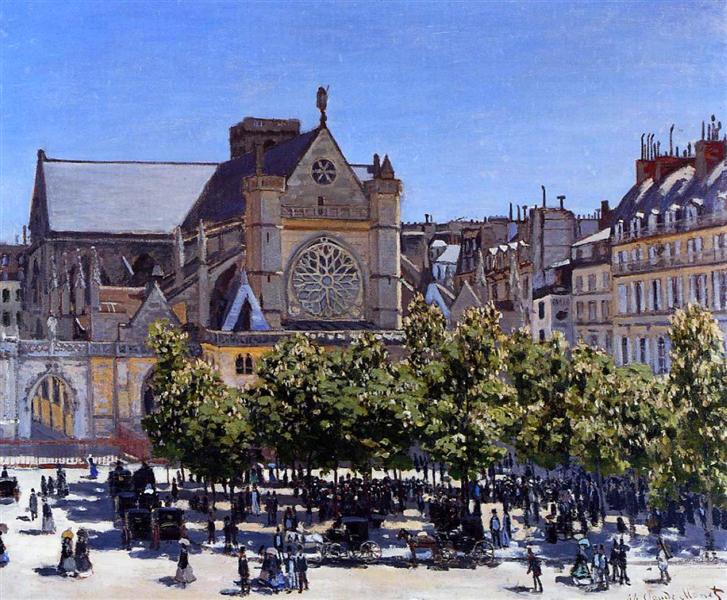Kuvaus
Claude Monet's 1867 painting "Saint Germain L'Auxerrois" is part of a crucial period in the artist's career, where he began to consolidate his style that would eventually pave the way for Impressionism. In this painting, Monet captures the architecture of the Saint Germain L'Auxerrois church in Paris with an approach that highlights both the structure and its surroundings. The use of light and color is central to this work, as it reflects the painter's signature ability to play with atmosphere.
At first glance, what stands out is the impressive depiction of the bell tower in the background, which acts as the compositional backbone of the work. Monet uses a colour palette that encompasses the browns and greys that define the church, combined with flashes of green and blue in the sky and surroundings. This mix suggests a specific time of day, perhaps at twilight, when the light tends to soften shapes and accentuate colours.
The work is not limited to a simple architectural representation; Monet breathes life into the scene by incorporating human figures that are scattered in the foreground. These figures, although mostly mere diffuse silhouettes, help to contextualize the work and add a sense of scale and activity, suggesting the importance of the church in the daily lives of Parisians at the time. The depiction of anonymous figures in the urban context is also common in Monet's work, pointing to his interest in the interaction between architecture and people.
A fascinating aspect is how Monet manipulates light to create shadows and reflections that lend an almost ethereal dimension to the work. Loose, spontaneous brushstrokes are characteristic of his impressionist technique, where the focus is more on the perception of light than on the faithful representation of details. This way of painting responds to Monet's interest in recording the moment and change, aspects that he would explore throughout his career.
The Church of Saint Germain L'Auxerrois was not an invented subject, but has been a place of great relevance in the history of Paris, associated with historical and cultural events. Monet, by choosing this architectural event, not only makes a study of light and colour, but also a visual exploration of Parisian identity, encapsulating the essence of the city at a particular time.
Through Saint Germain L'Auxerrois, we can see how Monet begins to distance himself from the conventions of academic art of his time and take steps towards finding a new form of representation. Although this work may not be as widely recognized as his more famous landscapes, it embodies the artist's stylistic evolution and his talent for capturing the fleetingness of the moment, which would go on to define the Impressionist movement in the future. Thus, the painting stands as a testament to Monet's ability to transform the everyday into art through his unique poetic vision.
KUADROS ©, a famous painting on your wall.
Hand-made oil painting reproductions, with the quality of professional artists and the distinctive seal of KUADROS ©.
Painting reproduction service with satisfaction guarantee. If you are not completely satisfied with the replica of your painting, we will refund 100% of your money.

